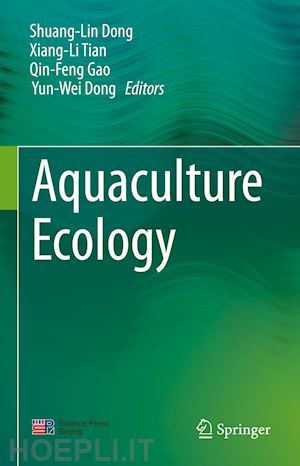
Questo prodotto usufruisce delle SPEDIZIONI GRATIS
selezionando l'opzione Corriere Veloce in fase di ordine.
Pagabile anche con Carta della cultura giovani e del merito, 18App Bonus Cultura e Carta del Docente
This book introduces aquaculture ecology as a science of the interaction between commercial aquatic organisms as well as their farming activities and the environment, including the rationales of building and management of aquaculture systems. This book covers productivity and carrying capacity, effects of cyclical fluctuation of environmental factors on aquatic organisms, biological control of water quality, structural optimization of aquaculture systems and ecological prevention of disease. In the last chapter, aquaculture production systems are introduced from multiple perspectives.
This book has been designed to provide a stimulating and informative text for researchers in aquaculture, fisheries as well as hydrobiology.
Shuang-lin Dong is the head of Laboratory of Aquaculture Ecology at Ocean University of China, the director of Marine Economy Society under Chinese Society for Oceanogroghy, and the head of Aquaculture Ecology Society under Chinese Society for Oceanology and Limnology. His research focused on aquaculture ecology, especially biological regulation of water quality, structure optimization of integrated aquaculture systems, ecological intensification and sustainability of aquaculture systems. Currently he devotes himself to the ecology and technology of far-offshore fish farming. Shuang-lin got his Ph.D. in Aquaculture in 1992 from Ocean University of China in Qingdao. Since 1994 he has been working at Ocean University of China as an associate professor, professor, the Vice President of Ocean University of China (2003-2015). He served as the Vice Chairman of China Society of Fisheries from 2005 to 2012, and the Convenor of Fisheries Discipline of Discipline Assessment Group of the State Council of China from 2014 to 2019.
Xiang-li Tian is a professor in the Laboratory of Aquaculture Ecology at Ocean University of China. He obtained his Ph.D. in Aquaculture from Ocean University of China in 2001. He has studied aquaculture ecology, especially microbial ecology in mariculture, for over 20 years. Currently, his research has mainly focused on the structure and function of microbial community in aquaculture ecosystems and application of probiotics. Xiang-li has published more than 200 peer-reviewed papers in English and Chinese, and six books (in Chinese).
Qing-feng Gao is a professor in the Laboratory of Aquaculture Ecology at Ocean University of China. In 2005, Qin-feng got his Ph.D. in Marine Ecology from the City University of Hong Kong. His study field is focused on aquaculture ecology with over 20 years of research experience, especially the interactions between far-offshore salmon farming and marine environment at the present. Qin-feng published more than 100 peer-reviewed papers in English and Chinese.
Yun-wei Dong is a professor in the Laboratory of Aquaculture Ecology at Ocean University of China, and the deputy director of Aquaculture Ecology Society under Chinese Society for Oceanology and Limnology. He received his Ph.D. in Ecology in 2002 from Beijing Normal University, and has worked in the fields of aquaculture ecology and animal ecological physiology for over 20 years and now is interested to study aquaculture zoning in the context of climate change. Yunwei has published more than 100 peer-reviewed papers in English. Yunwei is a member of some scientific associations (e.g., Chinese Society of Marine Ecology, Chinese Society of Animal Ecological Physiology), and services as associate editor of some international journals, like Diversity and Distributions, Journal Marine Experimental Biology and Ecology, Marine Life Science & Technology.











Il sito utilizza cookie ed altri strumenti di tracciamento che raccolgono informazioni dal dispositivo dell’utente. Oltre ai cookie tecnici ed analitici aggregati, strettamente necessari per il funzionamento di questo sito web, previo consenso dell’utente possono essere installati cookie di profilazione e marketing e cookie dei social media. Cliccando su “Accetto tutti i cookie” saranno attivate tutte le categorie di cookie. Per accettare solo deterninate categorie di cookie, cliccare invece su “Impostazioni cookie”. Chiudendo il banner o continuando a navigare saranno installati solo cookie tecnici. Per maggiori dettagli, consultare la Cookie Policy.